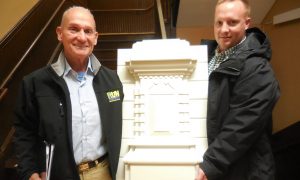WESTFIELD – Funding to repair the roof and chimney of the Dewey House on South Maple Street was recently approved by the Community Preservation Committee (CPC) which voted unanimously to commit $30,800 to protecting the building, constructed in 1735.
Candy Pennington of the Dewey House Trustees said the group, which is an arm of the Western Hampden Historical Society, the owners of the historic structure, plans to make the roof repair using materials, cedar shakes, which would have been used during the period when the house was originally built.
The group will also repair the brick chimney original to the Dewey House while the roof work is being done.
“It makes sense, from a tradesman’s point of view, to do the chimney while you’re up there repairing the roof,” CPC Chairman Joe Muto said.
Muto then asked City Planner Jay Vinskey if the commission had the funds available for the Dewey House renovation project.
Vinskey suggested that the funding in the commission’s historical preservation reserve account, approximately $45,000, was more than sufficient and if other historical preservation projects were submitted the commission could use unrestricted reserve funding. CPC funds are raised through a one percent surtax on property transactions that city residents approved.
The Community Preservation Act (CPA) requires that 30 percent of the funds raised through the surtax be used for three specific purposes, with 10 percent dedicated annually to each of those special accounts, which are: low and moderate income housing, recreation and open space, and historical preservation,. The remaining 70 percent is placed into the unrestricted account and can be used for any purpose allowed by the Community Preservation Act.
Vinskey asked that the commission approve $9,900 from the unrestricted account to survey property the city is purchasing to preserve open space on Northwest Road.
The City Council in January approved $381,500 in funding to purchase more than 62 acres of farm lands off Northwest Road currently owned by John Pitoniak.
The Community Preservation Commission had voted to recommend the purchase nearly two years ago.
Last year the City Council, which has to appropriate the purchase funds under the provisions of the Community Preservation Act, heard the details of the deal from Thomas Pitoniak, John’s nephew. However the City Council could not act on the CPC’s recommendation at that time because of a technical issue. Under the CPA there is a requirement for an organization to act as the agency to ensure conditions of the conservation restriction are enforced.
Originally the city, which will now own the property, had planned to have the city’s Conservation Commission serve as that enforcement agent, but was informed by state officials that the city could not be both the owner and conservation restriction enforcement agency.
City Planner Jay Vinskey said the issue was recently resolved and the new funding request, which was increased by $21,500, was money for the Massachusetts Audubon Society, through a local chapter, who will serve as the conservation restriction enforcement agency for the city.
The purchase of the 62.9 acres is part of 113 acres parcel which will be under conservation restrictions. The land abuts Little River and includes woodlands adjoining city-owned property where a municipal water well is located.
The CPC had placed the funds into a open space reserve account after the first vote to support the project, so the money has been available, just waiting for the City Council action to complete the purchase.
Vinskey said Thursday night that the Audubon group requested the property survey, which will become part of the deed registration, to specifically identify the boundaries of the open space land.
“The survey, which will record the property boundaries, is to protect the interests of the city,” Vinskey said. “Hopefully we will be closing, within a couple of weeks, on that property.”
The survey will also be part of the conservation restriction which has to be approved by the state.







